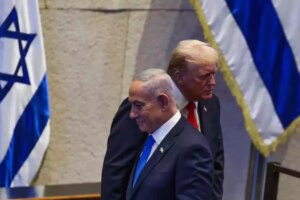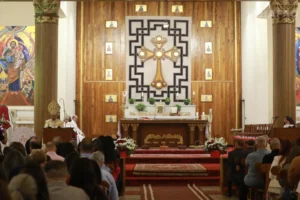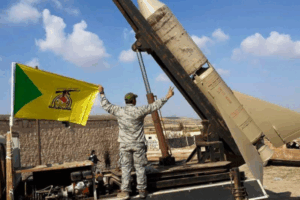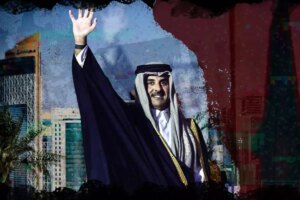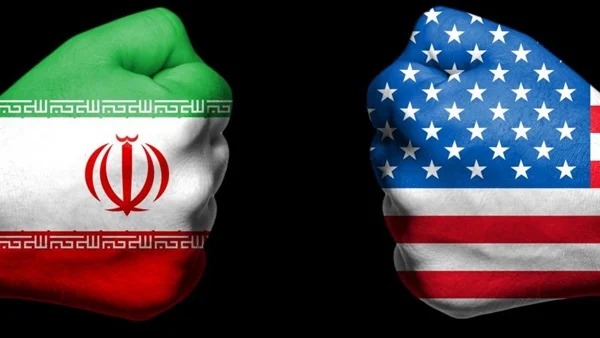
Shafaq News
Ahead of Iraq’s November 11 elections, Iran bets on deep bonds while
Washington banks on state control — and Baghdad struggles to turn exposure into
leverage.
As Iraq moves toward the parliamentary elections — preceded by special
voting on November 9 — the country finds itself once again pulled between two
gravitational centers: Iran’s entrenched networks of influence and Washington’s
strategic leverage.
Both claim to seek a “stable, sovereign Iraq,” yet each defines
stability on its own terms — and their competing expectations will frame the
reality Iraq’s next government must navigate.
Tehran’s Thesis: Deep Ties as Shock Absorbers, Not Shock Troops
For Tehran, Iraq’s elections are not a fleeting contest but part of a
long continuum linking two nations by faith, geography, and shared blood.
Iranian policymakers — across conservative and reformist lines — see Iraq’s
stability as inseparable from Iran’s own security.
“Iran does not feel any real concern about the elections,” said Ali
Akbar Barzanouni, Iranian writer and political commentator, “because the
relationship between the two peoples and governments is deep-rooted and cannot
be shaken by temporary political changes or foreign attempts to sow discord.”
Barzanouni described the vote as an internal Iraqi matter that Tehran
respects, stressing that Iran’s approach has never been about control but about
“supporting Iraq’s sovereignty and stability.”
In Tehran’s calculus, a strong, independent Iraq is not a threat but an
asset — a bulwark against chaos, terrorism, and Western pressure.
Over the past two decades, Iran has built an intricate web of political,
cultural, and security linkages inside Iraq — most visibly through its
relations with the Coordination Framework (CF), the Shiite alliance currently
steering Baghdad’s government. Iranian officials often frame this network as a
stabilizing structure rather than a lever of dominance, citing episodes such as
the 2021 government impasse, when CF channels and Tehran’s mediation helped
prevent escalation.
Tehran also points to coordination in the anti-ISIS campaign as proof
that its engagement has served Iraq’s stability, not its division.
Iranian researcher Saleh al-Qazwini described this as a strategy of
“preventive caution.” He told Shafaq News that Tehran does not fear the
election results “as long as they bring political and economic stability to
Iraq, because turmoil in any neighboring state inevitably affects Iran.”
Regarding Iran’s relations with Iraqi parties, whether CF members or
independents, he affirmed that they are designed “to preserve dialogue and
institutional continuity, not domination.”
Jalal Joraghi, director of the Afaq Center for Iranian–Arab Studies in
Tehran, explained that Iran’s confidence rests not in political blocs but in
the Iraqi electorate itself. “Tehran counts on the awareness of the Iraqi
people in choosing their representatives,” he said, especially amid what Iran
perceives as US efforts to sway the outcome.
Joraghi emphasized that Tehran hopes for broad participation across
communities, arguing that “high turnout would reinforce Iraq’s political
stability and reflect positively on the region — and on Iran in particular —
since Iraq’s security is Iran’s security.”
He also cautioned that weak participation “could open the door to
American and Zionist conspiracies,” echoing Tehran’s view that legitimacy
through the ballot box is the surest shield against external interference.
Tehran’s approach, according to Mehdi Azizi, a scholar of Iranian–Iraqi
relations, remains pragmatic. “Iran is not afraid of Iraq’s elections,” he
said, “but it is concerned about American, Turkish, and certain Arab attempts
to reshape the regional political order.”
Azizi added that Iran’s engagement has historically reinforced Iraq’s
institutions and defense coordination, while also acknowledging Iran’s fears
that extremist remnants or former Baathist elements could resurface “under new
political fronts.”
Ultimately, the Iranian consensus is that Iraq’s democratic process —
however imperfect — has proved resilient and continues to buffer both countries
against larger regional shocks.
Washington’s Thesis: Stability Through State Control
In Washington, Iraq’s vote is viewed as a strategic test, not just a
democratic ritual. US officials and policy analysts see it as a moment that
could redefine influence across a region still reeling from the Israel–Iran
confrontation, Syrian instability, and shifting Gulf alignments.
“Washington’s top priority is a stable, representative, and nationalist
government in Baghdad — one capable of curbing Iranian influence and ensuring
all armed groups operate under state authority,” said Frank Mesmar, Republican
Party member and Chair of the Advisory Council at the University of Maryland.
His view mirrors that of Nabil Mikhael, a political analyst, who told
Shafaq News that the US favors continuity under Prime Minister Mohammed Shia
al-Sudani, citing “positive indicators in governance and the economy” during
his tenure.
Former US ambassador to Iraq James Jeffrey also praised the relationship
with al-Sudani, describing it as “solid and functional.” In a lecture at the
Washington Institute, he said Washington “prefers to continue working with
al-Sudani,” citing Baghdad’s restraint during the recent Israel–Iran
confrontation as proof of “growing policy independence.”
Mesmar agreed that al-Sudani’s reconstruction agenda and steps to reduce
reliance on Iranian gas are “positive outcomes” from Washington’s standpoint.
Yet, he and other experts warned that progress will be measured by Iraq’s
ability to bring militias under state control and keep its financial system
compliant with global standards.
Washington’s leverage still lies primarily in its control over dollar
liquidity and banking compliance, giving it quiet but decisive influence over
Baghdad’s fiscal breathing room.
Yet Baghdad has quietly widened its external bandwidth — expanding oil
contracts with China, deepening trade with Turkiye, and reopening Gulf
financial channels — signaling that the new Iraq no longer defines sovereignty
as equidistance but as multidimensional engagement.
Even among optimists, caution prevails. Mesmar noted that the Trump
administration — under its “New Middle East” vision — wants stability chiefly
to avoid a security vacuum that could enable ISIS’s return or widen Iran’s
regional leverage.
Jeffrey, meanwhile, told Shafaq News that Iraq’s elections should
produce “a stable, representative government that limits Iranian influence and
maintains political balance to prevent the return of authoritarianism.”
He lauded Iraq’s parliamentary system as a “safeguard against one-man
rule,” in contrast to Iran and Syria.
A US State Department spokesperson echoed this, saying Washington
continues to urge Baghdad to “disarm and dismantle militias aligned with Iran.”
On social media platform X, Mark Savaya, the US presidential envoy to Iraq,
reaffirmed US support for “a future free of militias.”
Mesmar told Shafaq News that Washington’s policy relies on a “carrot and
stick” approach: economic incentives and security cooperation balanced by
conditional pressure. He said future engagement may hinge on Baghdad’s progress
in integrating the Popular Mobilization Forces (PMF) into state institutions
and addressing human rights concerns.
At the same time, Robert Gulotty, an associate professor at the
University of Chicago, warned that the US could “refuse to recognize the next
government if it proves excessively inclusive of Iran-backed factions.”
Jeffrey acknowledged that while Iran’s influence has receded, it remains
potent. “Tehran will likely try to capitalize on it after the elections,” he
said, adding that the PMF — unlike Hezbollah in Lebanon or the Houthis — “is
not an effective tool against Israel or the US, which makes its containment
within state structures acceptable to Washington.”
Mikhael predicted that the Trump administration might apply “last-minute
pressure” to boost pro–al-Sudani lists, warning that an electoral setback for
the prime minister “would be a major blow to Trump’s Middle East strategy.”
However, he doubted Washington would resort to sanctions, saying that doing so
could “politically burn al-Sudani” by branding him too close to the US while “militias regain ground.”
“Yet even as Washington fine-tunes its conditional engagement, both
powers increasingly find themselves managing expectations rather than dictating
outcomes.
Converging Interests, Divergent Methods
Both Tehran and Washington agree on the need for a functioning Iraqi
state, the containment of ISIS, and the continuation of oil flows. But beyond
those basics, their priorities diverge sharply.
–Command of Force: The US demands strict subordination of “militias” to
the state; Iran views their integration as stabilizing.
–Financial Control: Washington pushes banking compliance; Tehran fears
such measures as tools of political coercion.
–Energy: The US seeks diversification away from Iranian gas; Iran
depends on that trade as a political and economic lifeline.
–Regional Posture: Washington fears Iraq as a corridor for Iranian
logistics; Tehran fears Iraq becoming a staging ground for US containment.
The Election as Pressure Cooker
Iraq’s proportional representation system ensures fragmented results and
forces post-election coalition building — a process that both Tehran and
Washington attempt to influence indirectly.
For Iran, a high turnout signifies legitimacy and insulation from
outside manipulation. For the US, post-election cabinet composition —
especially portfolios like Defense, Interior, Finance, and Oil — will signal
which camp holds sway.
Four Post-Election Pathways
1) Continuity-Plus
Al-Sudani or a consensus figure returns with a balanced cabinet.
-Tehran: Accepts continuity, keeps CF networks intact.
-Washington: Strengthens economic and security cooperation conditioned
on PMF discipline.
2) CF-Dominant Cabinet
The Coordination Framework secures a commanding majority.
-Tehran: Comfortably positioned but wary of overreach.
-Washington: Tightens financial pressure; limits engagement.
3) Fragmented Parliament, Prolonged Negotiations
Months of deadlock before forming a government.
-Tehran: Mediates among Shiite factions.
-Washington: Supports technocratic caretakers.
4) Upset Coalition with Nationalist/Independent Surge
A mixed alliance challenges CF dominance.
-Tehran: Expands outreach, hedges influence.
-Washington: Welcomes rhetoric, waits for actions.
Read more: The Battle for Iraq’s “Largest Bloc”: A Renewed Struggle over Power and Definition
Whatever the scenario is, the next Iraqi government’s survival will
depend on pragmatic sequencing: giving each power enough to stand down while
delivering domestic wins.
Neither Tehran’s faith in “deep bonds” nor Washington’s reliance on
“conditional partnership” guarantees Iraq a stable future. What Baghdad can
achieve, however, is managed equilibrium — turning its exposure into leverage.
Between these two fires, Iraq’s best defense may lie not in choosing
sides, but in sequencing deliverables that keep both powers engaged — just
enough to contain pressure and shift the narrative from survival to governance.
Written and edited by Shafaq News staff.
